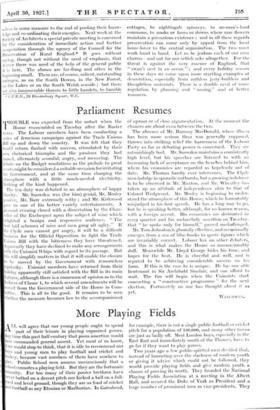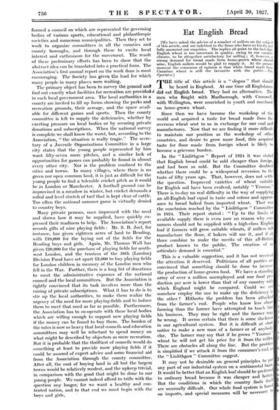More Playing Fields
1.1, will agree that our young people ought to spend part of their leisure in playing organized games. fly time this past half-century that pious assertion would re commanded general assent. Yet most of us know, If We would stop to think, that it is idle to recommend our Ys and young men to play football and cricket and key, because vast numbers of them have nowhere to Y. Public School men assume unconsciously that a ehool connotes a playing field. But they arc the fortunate nority. Far too -many of their poorer brethren have never batted on a decent pitch nor kicked a ball on a full- ized and level ground, though they are as fond of cricket d football as any Etonian or Marlburian. In Gateshead, for example, there is not a single public football or cricket pitch for a population of 136,000, and many other towns are just as badly off. Most London boys, especially in the East End and inunediately south of the Thames, have to go far if they want to pkty games.
Two years ago a few public-spirited mcn decided that, instead of lamenting over the slackness of modem youth or giving it advice which could not 'be followed, they would provide playing fields and give modern youth a chance of proving its worth. They founded the National Playing Fields Association at a meeting in the Albert Hall, and secured the Duke of York as President and a large number of prominent men as vice-presidents. They formed a council on which are represented the governing bodies of various sports, educational and philanthropic societies and numerous municipalities. Then they set to work to organize committees in all the counties and county boroughs, and through these to excite local interest and enthusiasm for the movement. The result of these preliminary efforts has been to show that the abstract idea can be translated into a practical form. The Association's first annual report on the work done is most encouraging. The Society has given the lead for which many people in many places were waiting..
The primary object has been to survey the ground an find out exactly what facilities for recreation are provided,* in each local government area. The local authorities in a county are invited to fill up forms showing the parks and recreation grounds, their acreage, and the space avail- able for different games and sports. Then the county committee is left to supply the deficiencies, whether by exerting pressure on local bodies or by securing private donations and subscriptions. When the national survey is complete we shall know the worst, but, according to the Association, "the situation is really tragic." The secre- tary of a Juvenile Organizations Committee in a large city states that the young people represented by him want fifty-seven more pitches, and a similar lack of opportunities for games can probably be found in almost every other city. Nor is the problem confined to the cities and towns. In many villages, where there is no green nor open common land, it is just as difficult for the young people to find a tolerable cricket pitch as it would be in London or Manchester. A football ground can be improvised in a meadow in winter, but cricket demands a rolled and level stretch of turf that is kept clear of cattle. Too often the national summer game is virtually denied to country boys.
Many private persons, once impressed with the need and shown how it may be supplied, have quickly ex- pressed their readiness to help. The Association's report records gifts of nine playing fields : Mr. S. B. Joel, for instance, has given eighteen acres of land to Reading, with £10,000 for the laying out of the fields for the Reading boys and girls. Again, Mr. Thomas Wall has given £20,000 for the purchase of playing fields for south- west London, and the trustees of the 58th (London) Division Fund have set apart £3,000 to buy playing fields for London children in memory of the London men who fell in the War. Further, there is a long list of donations to meet the administrative expenses of the national council and the local committees. But the Association is rightly convinced that its task involves more than the raising of private subscriptions. What it has to do is to stir up the local authorities, to make them realize the urgency of the need for more playing-fields and to induce them to meet that need as far as possible. Furthermore, the Association has to co-operate with these local bodies which are willing enough to support new playing fields if the money Can be found to buy them. The burden of the rates is now so heavy that local councils and education committees may well be reluctant to spend money on what might be described by objectors as mere recreation. But it is probable that the thriftiest of councils would do something at least to provide more playing fields if it could be assured of expert advice and some financial aid from the Association through the county committee. After all, the cost of buying land in all but the largest towns would be relatively modest, and the upkeep trivial, in comparison with the good that might be done to our young people. We cannot indeed afford to trifle with the question any longer,' for we want a healthy and con- tented nation, and to that end we Must begin with the boys and girls.











































 Previous page
Previous page